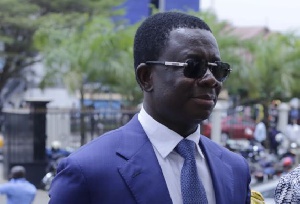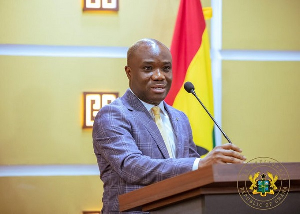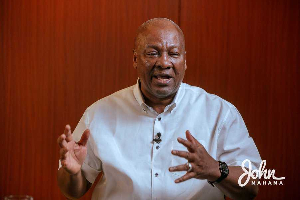The trial of former Chief Executive Officer of Ghana Cocoa Board (COCOBOD), Dr. Stephen Kwabena Opuni and the Managing Director of Agricult Ghana Limited, Seidu Agongo, who have been accused of causing financial loss to the state has resumed with lawyers grilling the first prosecution witness for more than four hours.
The trial was initially put on hold for two months due to the legal vacation which began from August 1, 2018.
Before the legal vacation, the Executive Director of Cocoa Research Institute of Ghana (CRIG), Dr. Franklin Manu Amoah told the court that Dr. Opuni, sidestepped all rules governing the testing of new chemicals before their application on cocoa crops.
Dr. Opuni and businessman Seidu Agongo are before an Accra High Court for causing financial loss to the state to the tune of GH?217,370,289.22.
The two are facing a total of 27 charges including defrauding by false pretense, willfully causing financial loss to the state, money laundering, corruption by a public officer and contravention of the Public Procurement Act.
Yesterday’s proceeding was led by Dr. Opuni’s lawyer, Samuel Codjoe who cross-examined Dr. Amoah, who had already ended his evidence-in-chief in July.
The cross-examination centred on the efficacy of Lithovit foliar fertilizer as well as the authenticity of the certificate given to Agricult Ghana Limited whose owner, Seidu Agongo, is also on trial for supplying the fertilizer to cocoa farmers.
Mr. Codjoe insisted that re-evaluation by the Cocoa Health Extension Division (CHED) of COCOBOD indicated that Lithovit liquid fertilizer induced prolific flowering which will result in higher yield, as affirmed by Dr. Francis Baah, the Executive Director of CHED.
He averred that it is based on the re-evaluation done by CHED that it came to light that Lithovit Liquid Fertilizer was efficient and could improve yield.
He put it to the witness that he was (witness) privy to this information because he had extensive discussions with the Executive Director of CHED, Dr. Baah on the efficacy of Lithovit Foliar fertilizer.
The witness, Dr. Amoah, however, stated that he never had any conversation with Dr. Baah about Lithovit Liquid foliar fertilizer but rather, Dr. Baah told the transition team of CRIG of which he was a member.
He said he had no knowledge of any re-evaluation report by CHED as it is not its duty to undertake re-evaluation for renewal of certificates.
“As I’ve said, CRIG is for testing fertilizers used on cocoa and we are responsible for getting feedback from the farmers so if CHED conducts its survey and gets a feedback, it is for the consumption of their management whiles CRIG’s report would determine whether a certificate or a chemical should be accepted for renewal or not”, Dr. Amoah told the court.
Renewed Certificate
The lawyer also grilled the witness on the renewal of the certificate issued to Agricult Ghana Limited in 2014 and 2015.
Dr. Amoah was shown two certificates and he confirmed them to have been issued by CRIG in 2014 and 2015. The lawyer subsequently tendered them into evidence with no objection from the prosecution led by Yvonne Attakora, the Director of Public Prosecution.
“So the two certificates are certificates which confirm that CRIG has conducted the evaluation for each year after having gone through their processes isn’t it?” Mr. Codjoe queried.
But Dr. Amoah said he only got to know about the renewal of the certificates in 2014 and 2015 when he took over as the Executive Director of CRIG.
He explained that he cannot confirm if “CRIG went through their processes before issuing these certificates since I was not in the system”.
“And more so my lord, these certificates are different from what was issued in 2014. This one says Lithovit Fertilizer with trademark ‘R’ suggesting that, that product has been patented by the mother company GMH based in Germany which brought the product and the original product which was tested as powdery product for which a certificate was issued in 2014. The implication is that nobody can market Lithovit foliar fertilizer in any other form than the powdery fertilizer tested at CRIG”, Dr. Amoah Added.
Financial Motivation.
Mr. Codjoe then accused the witness of accepting to come back to CRIG on a contract because of the monetary motivations as what he was getting from the universities was nothing close to what he got when he returned to CRIG.
The lawyer initially wanted Dr. Amoah to tell the court what his monthly salary at CRIG was but the prosecution objected to the question saying salary issues are privileges between an employee and his employer.
The court presided over by Justice Clemence Honyenugh overruled Mr. Codjoe’s request and asked the lawyer to move on with his next question.
The lawyer then put it to Dr. Amoah that the money he was earning from the universities and his research work were not paying him enough which was why he was eager to return to CRIG.
But Dr. Amoah denied the allegation saying he was happy assisting the universities and some research institutes after he retired from CRIG and his return had nothing to do with money.
Allegations
The court was taken by surprise when Mr. Codjoe put it to the witness that before he left CRIG as its Executive Director, there were allegations that he unlawfully went into the concessions of COCOBOD and unlawfully harvested timber for private use.
“There were several unfounded allegations levelled against me which the Dr. Opuni himself instituted a committee to investigate. These allegations were always published in the Daily Post newspaper. There were about eight of them”, Dr. Amoah noted.
He added that the committee at the end of its findings realised that those allegations were unfounded and the architect behind them was transferred to another region.
General News of Tuesday, 9 October 2018
Source: dailyguideafrica.com

















